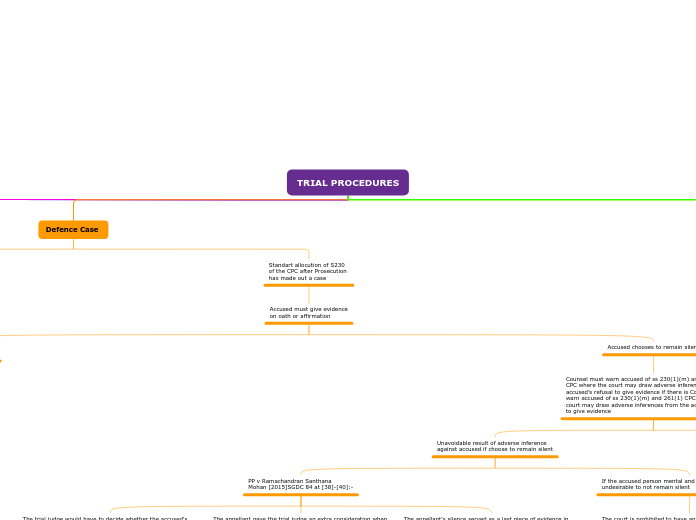door Aamir Kamsari 1 jaar geleden
132
TRIAL PROCEDURES

door Aamir Kamsari 1 jaar geleden
132

Meer zoals dit
Goh Cheng Chuan v PP [1990] 1 SLR(R) 660 (HC)
All imprisonment sentences must be pronounced in the accused’s presence
Imprisonment
Community orders
Death Penalty
Caning
Fine
an offence punishable by fine only or by imprisonment for 12 months or less, or both
a etter plead guilty and agree to pay any fine that may be imposed for that offence
appear by an advocate
Accused chooses to remain silent
Counsel must warn accused of ss 230(1)(m) and 261(1) CPC where the court may draw adverse inferences from the accused’s refusal to give evidence if there is Counsel must warn accused of ss 230(1)(m) and 261(1) CPC where the court may draw adverse inferences from the accused’s refusal to give evidence
Unavoidable result of adverse inference against accused if choose to remain silent
If the accused person mental and physical condition makes it undesirable to not remain silent
The court is prohibited to have any adverse inference against accused- S261 of the CPC
PP v Ramachandran Santhana Mohan [2015]SGDC 84 at [38]-[40]:-
The appellant's silence served as a last piece of evidence in the chain of evidence, proving the appellant's guilt beyond a reasonable doubt when taken into account in conjunction with other pieces of evidence.
The appellant gave the trial judge an extra consideration when determining whether the appellant's guilt had been proven beyond a reasonable doubt by failing to refute the evidence, which as it stood would have supported his conviction if left unchallenged.
The trial judge would have to decide whether the accused's guilt could be proven beyond a reasonable doubt based on the prosecution's witnesses' whole case as well as any appropriate conclusions that could be made from his silence.
Accused agrees to give evidence
Subtopic
that the evidence on the primary facts is true unless the evidence is inherently incredible
The test does not apply to determine if all of the evidence examined will definitely and inevitably lead to a single conclusion.
Essentially, at the conclusion of the prosecution's case, the judge should ask himself, not, "Has the prosecution's evidence already done so," but rather, "If I were to accept the Prosecution's evidence as accurate, would it establish the case against the accused beyond a reasonable doubt?"
The credibility of the witnesses and the quality of the evidence are not issues for the court at this point. If the credibility is only questioned, questions still need to be answered. Evidence should only be disregarded if it is irrational, or if a reasonable person could find it to be true.
Until all evidence on behalf of the prosecution and defence has been heard, the judge should be open-minded about the truthfulness and accuracy of the recollections of the witnesses. There's no reason to wonder if the witness's evidence is questionable. Acceptance of the evidence is required unless it is manifestly implausible.
Acquittal of accused
Evidence not inherently incredible
Accept evidence as accurate
Evidence establishes each essential element of the offence